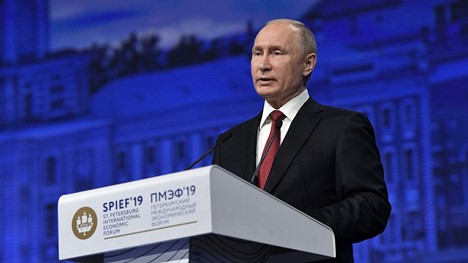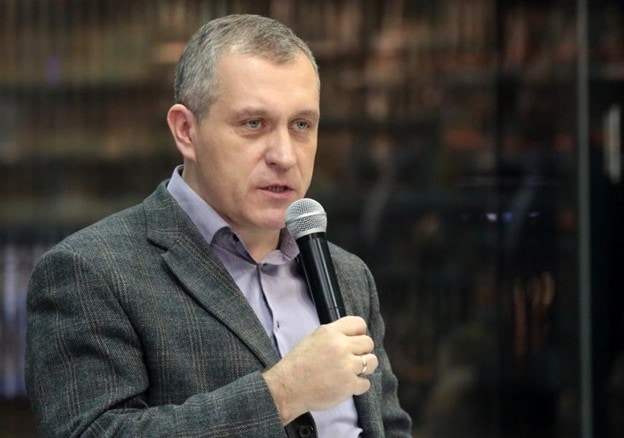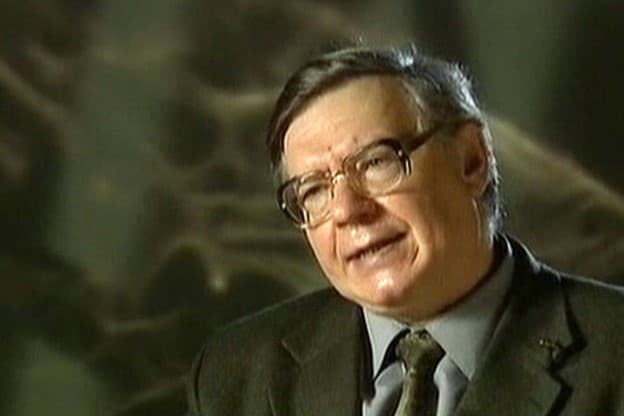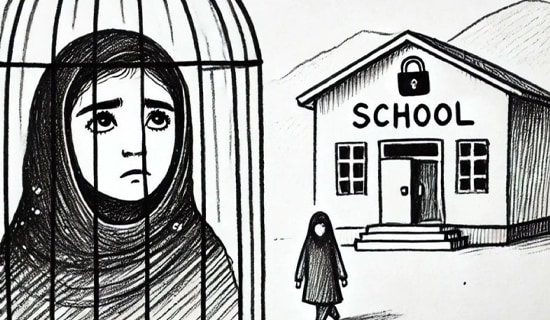Responding to a question from Bloomberg executive editor Rosalind Mathieson at the sidelines of the St. Petersburg International Economic Forum Russian President Vladimir Putin compared America's mistakes with those of the defunct Soviet Union:
"You know what the problem is? I will tell you as a citizen of the former Soviet Union. What is the problem with an empire? They think they are so mighty they can afford minor faults and mistakes. It is okay, we will buy these people and scare other people; we will reach an agreement with still others, give beads to those and threaten others with our warships – problem solved. But problems are piling up, and there comes a time when it is no longer possible to cope with them all. And the United States is firmly and steadily following in the footsteps of the Soviet Union."[1]
This is not the first time that the charge has appeared and is usually associated with attacks on America's unipolar conceit as opposed to Russia's presumably multilateral approach and respect for international institutions.
Andrey Rezchikov for the Vzglyad newspaper sounded out experts on the validity of Putin's statement. Quite unsurprisingly, they agreed with Mr. Putin but they cited different reasons for justifying his remarks.
Rezchikov's survey titled "The US Has Fallen into the Soviet Trap" follows below: [2]

Vladimir Putin addresses the St. Petersburg International Economic Forum (Source: Ria.ru)
"The US is encountering problems typical of all empires. As occurred with the USSR, the US, confident in its own power, creates problems for itself that it can no longer handle. Russian President Vladimir Putin said this during a conversation with journalists on the sidelines of the St. Petersburg International Economic Forum (SPIEF). According to the president, the threats sounded by the US happened in the course 'of internal political processes' and their authors depart from the premise that US economic, military and political strength will enable it to overcome any problems.
"The Russian leader recalled the Soviet past and said that the main problem with empires is the misperception about its might and the false certainty that it could 'allow itself small errors and mistakes'...
"At the peak of the Ukrainian events of 2015 there were talks that the US is repeating the Soviet Union's mistakes. American political scientist, William Polk wrote that the US was repeating in Ukraine those same mistakes that the Soviet Union committed when it barged into Cuba in 1962, which ultimately led to a major crisis. Polk emphasized that Ukraine, 'is not part of our sphere of influence or dominance' and 'Russia will never stand by [and allow] Ukraine to become a member of a hostile military alliance.'
"The expert community agrees that America in fact doesn’t want to learn from the mistakes of others and in some respects repeats the experience of Soviet leaders. Boris Mezhuev, an associate professor at the Faculty of Philosophy at Moscow State University and a political scientist and America-watcher, is convinced that maintaining the Euro-Atlantic bloc will prove the hardest task for the US 'precisely as it proved difficult for the USSR to maintain the socialist bloc.'
"The breakaway of allies from the socialist bloc eventually led to the USSR's collapse. 'The President had in mind the condescending attitude of the Americans towards their own Euro-Atlantic partners. Currently, the policy towards them is somewhat softer after the harsh policies displayed by ex-President Donald Trump and George W. Bush. Now the Euro-Atlantic bloc is going through a period of gradual dissolution,' claimed Mezhuev.
"He believes that France and Germany are already conducting an independent policy, primarily with respect to China. 'A [mutinous] Fronde' of conservative democracies, led by Hungary and partly by Poland, is emerging. In the 90s, the US rejected Russia’s open hand and its clear gravitation toward the West, and subsequently the idea of 'further expansion of military blocs eventually led to the current stage of escalation in relations between Russia and the Euro-Atlantic.'
"On top of that, internal problems are accumulating in the US. The country is split between those, who want to see America as powerful and conservative power, and those who, strive for a further mixing of sexes and races.
"'Additionally, an insane and completely unjustified interventionism has occurred [in US policy]. The Soviet Union failed to understand that there are certain limits to external advances and decided to try its luck in Afghanistan. A clash with a wave of Islamic fundamentalism resulted in a weakened Soviet Union. In the early 2000s, the US faced the very same [Islamic fundamentalists] in Afghanistan. The US intervention in Iraq strengthened the “Shiite axis.” As a result, the balance was destroyed, leading to a global retreat from the relatively prosperous period of the 1990s,” assured Mezhuev."

Boris Mezhuev (Source: Antimaidan.ru)
"Stanislav Tkachenko, a professor in the Department of European Studies of the Faculty of International Relations of St. Petersburg State University, and a Valdai Club expert, agrees with him. 'It seems that Putin meant that the US is a country with limited resources, and therefore they cannot be utilized to solve all problems.
"'Putin knows better than anyone else in Russia that the US is capable of fighting at most two major wars, in which soldiers will be involved in the tens of thousands and hundreds of billions of dollars will be spent. A third war is beyond their capabilities. There are quantitative limits to what a modern empire can afford,' said Tkachenko.
" political scientist recalled the term 'imperial overstretch'. It means a country losing control over a situation due to an inadequate assessment of its resources. The state begins to spend more than its economy allows. 'The Soviet Union began to overactively compete with the United States in the Third World countries. The USSR reached into Chile and Nicaragua and almost started World War III over Cuba,' stressed Tkachenko.
"Another reason for an empire’s collapse, according to the expert, is an increasingly powerful enemy. In the political science community, this phenomenon is called the Thucydides’ trap. It describes a situation when an ascending power clashes with a declining power or one in crisis. And only one country can constitute such a rival for the US, 'China is an existential threat that tries to compete with the US everywhere: in economic and political models, in solving the society’s problems (as we witnessed during the pandemic). So, the real threat to the US is not internal, but external.'"

Stanislav Tkachenko (Source: Trend.az)
"In contrast, Vladimir Vasilyev, chief researcher at the Institute of the USA and Canada of the Russian Academy of Sciences, believes that the US is experiencing serious domestic problems, similar to those that had befallen the USSR prior to its collapse.
"'Today, America as well, is on the verge of a serious weakening of its inter-federal ties. The country is divided into blue states (Democratic states on the West and East coasts) and red states (Republican states of the south and the central part of the US). The ideological, economic and political schism between them is increasing. A decline in the country’s management from the [federal] center is decreasing. Washington’s initiatives encounter an ever growing opposition in the states,; explained the political scientist.
"Furthermore, after the January 6 storming of the Capitol the American model revealed its true nature. It turned out to be a repressive and authoritarian structure, as evidenced by the blocking of Trump’s social network accounts. The latter was almost made a state criminal; twice, impeachment proceedings were initiated against him.
"According to the political scientist, the financial situation in the US is also challenging, 'The US is indebted up to its eyeballs. The national debt and budget deficit are growing, and the state’s redistributive role in the economy is increasing.'
"The expert claimed that the coronavirus pandemic can be perceived as ' An American Chernobyl”, which is already decimating the country's socio-economic and political development.'
"'There is blunt talk in America that the country’s model is changing to a socialist one. It is stressed that the previous model led to some form of crises, that it is ineffective. Similar events happened in the Soviet Union in the latter half of the 1980s. Back then it was claimed that socialism was inefficient and it is necessary to take Western economic models as a basis. The prevailing point of view in the Soviet Union was that its economy had a redistributive character. The same strange process is happening in the US today; the American economy is getting increasingly redistributive. The country is losing the ability to manufacture goods, the degradation of the labor force is growing, as well as the number of illegal immigrants,' emphasized Vasiliev."

Vladimir Vasiliyev (Source: Abnews.ru)
"Tkachenko is convinced that it would be in the entire world's interest, if the US were to follow Japan’s example. 30 years ago, the latter was perceived as a new empire, but “then it entered a period of a long crisis and the Japanese quietly distanced themselves from international relations and focused on the domestic market.”
"'The US possesses an excellent domestic infrastructure, and it will continue to attract talented people. If they abandon the concept of a City upon a Hill (i.e. that America is a model for the entire world) it would be a wise decision. And the dismantling of the unipolar model will be quite successful,' stated the political scientist."




